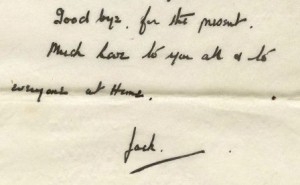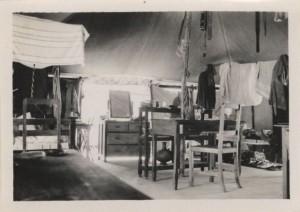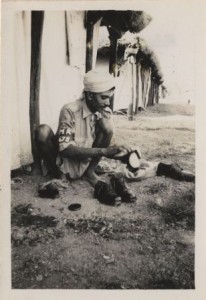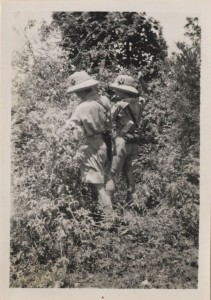The last few weeks have been so busy that there hasn’t been time for any posting! Long term project ideas are beginning to take up the slack left by the end of term, including an effort to inventory all of our Collections to ensure that they are properly stored, labelled and catalogued. However, thanks to the hard work of Chris and Hazel on this, I’ve managed to find a few spare moments to write a little bit about one of our major collections which I feel is very underused.
The Weatherill Collection consists of working papers, letters and photographs gathered over the lifetime of Bruce Bernard Weatherill (1920-2007), known to his friends as Jack. During the Second World War, Jack Weatherill was stationed in India. Every time I look at one or two items in this section of the collection, I find hidden gems. For this post, I’m just going to focus on two letters which Jack wrote home to his parents and sisters, but there are many more to be investigated.
On 6 September 1939, Jack enlisted in the army from his apprenticeship at the family firm, Bernard Weatherill Ltd., Sporting Tailors of Saville Row. In December 1940 he was commisioned as an officer but it wasn’t until 15 April 1942 that he set sail from Liverpool on the SS. Orbita for India. After two months, Jack arrived in Mumbai on 7 June and was attached to the 2nd Gurkha Rifles in Dehra Dun. Unfortunately, the postal system took some time to catch up with him; he wrote to his family on 18 July that ‘Your long awaited letter arrived on Tuesday…posted on the 23rd April’. Nevertheless, these letters were presumably the only contact which Jack and his family in England had with each other during his post abroad.
Weatherill’s described Dehra Dun favourably as ‘plenty doing and a pleasant climate, although the rains have set in now and when it rains there is no half measure about it’. The Indian weather caused ‘chaos’ during Jack’s posting near Poona in October that year, when ‘a hurricane …descended upon the camp on Saturday night’. He went on:
It was raining pretty heavily; when, suddenly, this wind descended with a roar. I just had time to grab the tent pole on my side of the tent, in an effort to keep it upright before a sudden gust lifted the tent like a parachute and deposited it some twenty yards away, together with our tables and odd belongings. I was still clinging onto the pole. The rain was so strong that it was impossible to see more than two yards in any direction, and the only thing to do was to flatten and wait for it to stop, which it did in a short time. The chaos was pretty terrific. Nearly every tent was flat and everyone rushing around madly trying to salvage their belongings… Surprisingly little has, in fact, been lost…”
Along with the drama of extreme weather, Jack wrote home of the culture which he found himself immersed in. In October, he wrote of a Regimental holiday being declared to mark Eid ul-Fitr, the local holiday marking the end of Ramadan. In the same letter, he remarked on ‘a Rajput Festival yesterday – I forget the name – at which a goat is sacrificed to the Goddess of War’. There was clearly a concerted effort to introduce the men stationed in India into the culture, including monthly exams in Urdu. After his first exam, Jack wrote ‘I now join the ranks of those form this unit who crack at it monthly…in the 46th everyone has to take it every month irrespective of standard. At any rate, it means at least one week-end in Town each month.’
Overall, the sense of these letters is of the mundane, commenting on the family’s holiday in Bournemouth and exchanging news of friends and relatives at home and abroad; ‘You remember Larry Rathbone…? He is in the Middle East somewhere – lucky dog.’
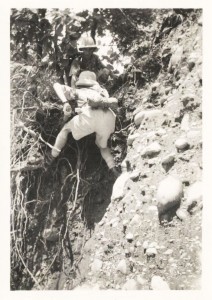
‘Hugh climbing one of the many small precipices we encountered on that little scheme. He only just made this one!’
However, in July 1942, before he was stationed briefly with the 46th Cavalry near Poona, Jack wrote home of ‘the little scheme we had on Monday last….A hardening test, it was supposed to give us experience in moving through the jungle by day, and by night.’ The photographs which Jack had to send seperately have been reunited with the letter, and illustrate the expedition. Initially, Jack, Hugh and ‘a Spaniard’ did well, completing the first, eight mile section and trekking into the hills where they ate their rations of a pound of raisins and a pound of nuts. ‘…we found this quite adequate although next time half the amount and a packet of tea would seem to be the ideal thing.’ However, as they set out on the last stage, with night closing in, things became more difficult. ‘It was terribly dark and the going across the hills and through the jungle was frightfully hard; on top of that it rained like mad.’ At midnight, still cutting their way through the jungle, they had a narrow escape ‘only just seeing a precipice in time’, at which point some of Jack’s companions decided to ‘call it a day. Unfortunately, they were the owners of the only torch.’ Those left had to spend the night in the open, with Jack commenting that ‘to give up in that manner was a pretty poor show.’
Needless to say, no-one slept a wink – no-one, that is, except Hugh, who slept soundly all night kept dry by the major portion of his neighbour’s groundsheet on both the left and the right. Actually it was very cold, and I for one was never more glad to see the daylight.
Although it continued to rain the next morning, Jack and his remaining companions made it back to the town in time for morning coffee. ‘Thank the Lord for instinct’, Jack wrote on seeing the terrain that they had managed to cover during the night. Unfortunately, after deciding to take a tonga for the last stretch of the journey, ‘feeling sure that no-one of importance could possibly be about at that unhealthy hour’, the group passed the Brigadier in his car, coming out of the camp!
Weatherill ends the anecdote by commenting:
“On looking back I cannot help feeling that in spite of the discomforts the whole thing was worth it, if only for the bathe we had on that Monday evening – water clear as crystal and cold as ice – straight from Nanda Devi itself it seemed; and so refreshing that even now it does one good to remember it.”
The sense of a positive outlook seems to run throughout Weatherill’s life and career. Jack was first elected to Parliament in 1964 and subsequently re-elected for Croydon North East seven times. He undertook several offices in government, including offices within HM Household and Privy Councillor and within the Conservative Whip’s Office. From 1983 to 1992, he served as Speaker of the House of Commons and was elevated to a life peerage as Baron Weatherill of North East Croydon in 1992. During this time, he was known to be ‘a gentleman’, keeping his word even if it meant losing his own cause. The Collection contains substantial materials on his public engagements and political work during his Parliamentary career, but to me these early letters are fascinating. Not only do they show Jack Weatherill’s progress through the war, one of so many men stationed to India during this time, but they also record an Englishman’s reaction to a largely unknown culture, with some glimpses of the Indian reaction to the soldiers stationed to the far flung part of the British Empire. As a historical record and as a glimpse of discovery in an unknown world, I think that the Weatherill Collection is one of the most intriguing in our archives.
All of the material in the Weatherill Collection is available through the normal Special Collections request process. You can have a look at the website for a detailed break down of the Collection, which is fully catalogued. To request access to any materials, please email us at specialcollections@kent.ac.uk.

